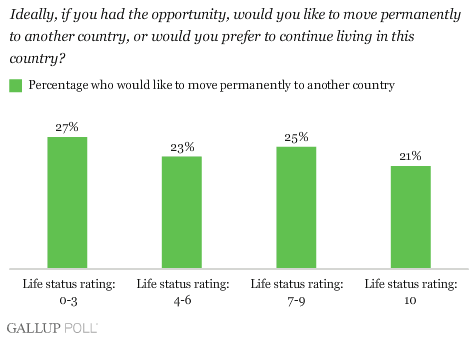This article is Part 2 of a series on attitudes toward migration in 20 Latin American countries.
WASHINGTON, D.C. -- Gallup Poll results from Latin America offer important insights into a topic of intense debate in the United States: immigration. Some of the findings counter conventional wisdom implicit in much of the U.S. dialogue. On average, 24% of Latin Americans region wide say they would like to move to another country, and their attitudes and perceptions underscore the risks of making blanket assumptions about their motives. This article continues Gallup's examination of how 2007 survey data from 20 countries throughout Central and South America challenge some of those entrenched assumptions. The first article in the series, "One in Four Latin Americans Wishes to Emigrate," delved into two assumptions about the number of Latin Americans wishing to emigrate and their preferred destination. (See this article in Related Items.)
Assumption #3: Unemployment and poverty force Latin Americans to leave their countries.
Unemployment and poverty are certainly driving factors in the region's poorest and least self-sufficient countries. In countries with per-capita GDP of $5,000 or less, 21% of respondents, on average, say a member of their household has recently gone to live in another country, and 31% say they themselves would move to another country given the opportunity. In countries with per-capita GDP of $10,000 or more, the percentages are somewhat lower, at 14% and 22%, respectively.
However, from a region-wide perspective -- and particularly when it comes to Latin America's larger economies -- desperate conditions can't fully account for the desire to migrate. In many countries, those who wish to emigrate do not necessarily view their current lives more negatively than those who wish to stay in their country. Respondents were asked to rate their lives on a scale from "0" to "10," with "10" being the best possible life for them. Those across the region who wish to emigrate are not heavily clustered at the low end of the scale -- even those who give their current lives a 10 are only slightly less likely than those who give a very low rating to say they'd like to move.

Furthermore, across the 20 countries studied, Latin Americans who say they do not have a job are no more likely than those who do have a job to say they would emigrate -- 23% of the former do so, versus 26% of employed respondents. In countries with the region's largest economies -- including Brazil, Argentina, Mexico, and Venezuela -- employed residents are at least as likely as those who are unemployed to say they'd emigrate given the opportunity.
It seems that job satisfaction in Latin America matters more than job availability in terms of driving migration intent. A follow-up question asking employed respondents whether they are satisfied with their current jobs produces an important distinction: 39% of those who are dissatisfied would like to emigrate, versus 24% of those who are satisfied.
Further, there is data to suggest the search for better jobs and opportunities to achieve more in life, rather than desperation and an inability to "make it" in their home countries, leads many Latin Americans to want to emigrate. We will discuss such evidence in the third and final part of this series.
Survey Methods
Results are based on face-to-face interviews conducted in 2007 with randomly selected national samples of approximately 1,000 adults, aged 15 and older, who live permanently in the 20 Central and South American countries polled. For results based on these samples, one can say with 95% confidence that the maximum margin of error attributable to sampling and other random effects is ±3 percentage points. In addition to sampling error, question wording and practical difficulties in conducting surveys can introduce error or bias into the findings of public opinion polls.